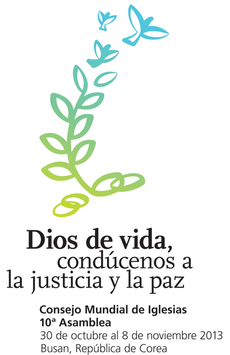Oración vespertina, 31 de octubre
This is a recording of the evening prayer, 31 October at the WWC 10th Assembly 2013, Busan, Republic of Korea. It is an Eastern Orthodox prayer, called "The service of Artoklasia" or "The Breaking of the bread".
This is a recording of the evening prayer, 31 October at the WWC 10th Assembly 2013, Busan, Republic of Korea. It is an Eastern Orthodox prayer, called "The service of Artoklasia" or "The Breaking of the bread".
Introduction by +Ambrose Cho Song Am, Metropolitan of Korea
In the very rich liturgical tradition of the Orthodox Church, there are many daily divine services, during which we worship and glorify the Triune God with "psalms and hymns and spiritual songs" (Eph.5:19). The Service of Artoklasia, which we will celebrate tonight, is one of the most popular divine services among Orthodox Christians.
The roots of the Artoklasia extend back to the earliest years of the Church. In fact, it is a remnant of the so-called "agape" (love) meals that traditionally took place either before or after the Holy Eucharist during the ancient Christian era. The Book of Acts, for example, relates that the early Christians used to gather "daily with one accord in the temple and breaking bread from house to house, they ate their food with gladness and simplicity of heart" (Acts 2:46).
The term "Artoklasia" means "slicing the bread," reminding us of the "breaking of the bread" (Acts 2:42, 20:7, etc.) that, in the New Testament, signifies the celebration of the Sacrament of the Eucharist.
Bread, being the most basic element of the Mediterranean diet, was used by the Lord Himself in His teaching, both on a practical and spiritual level. Our Lord Jesus Christ blessed the bread in many of His miracles during His redeeming work on earth (see Mt. 14: 13-21, 15: 32-38, Luke 24:30, etc.) because "bread strengthens man's heart" (Ps. 104:15).
Also, at the Last Supper, the Lord uses bread in order to deliver the Sacrament of the Eucharist. (Mt. 26:26). He also spoke symbolically by drawing a parallel between the bread and Himself as "the bread of life," and "the living bread which came down from heaven" (John 6:35, 51). In addition, the bread symbolizes the universal Church. This is because its members used to be dispersed widely, like wheat in the fields, but through Christ they were gathered in one body, like the bread. (See Teaching Didache of the Apostles IX, ΒΕΠ, 2,218).
The ritual of the Service of Artoklasia, which you will attend shortly, has been influenced by the account of the miraculous feeding of the five thousand, a miracle mentioned by all four Evangelists (Mt. 14: 13-21, Mk.6: 30-44, Lk.9: 10-17, John 6: 1-14). As we know, John mentions that Jesus took five loaves from His Disciples and after saying a prayer of thanks, He distributed them along with two fish, first to His Disciples and His Disciples to the people seated on the ground. Today, out of respect for Korean customs, we are using five pieces of Tok, which is made from rice, instead of five loaves of bread, since rice—not wheat—is the basic grain of the daily Korean diet.
The piece of Tok that you will be given at the end of the Service is not the Holy Eucharist. It is simply a blessed piece of Tok. By the act of sharing Artoklasia with everyone at the end of a common prayer, our Orthodox Church reminds us of two very important teachings: First, we ought to share part of the spiritual and material goods that God has provided with the destitute and needy people around us. And secondly, by singing the beautiful hymn "The rich have turned poor and gone hungry, but they who seek the Lord shall not be deprived of any good thing" we are reminded not to concentrate our minds on the acquisition of material wealth, "where moth and rust destroy and where thieves break in and steal" (Mt.6:19), but instead to have unshaken faith in God's promise: "seek first the kingdom of God and His righteousness, and all these things shall be added to you" (Mt. 6:33).
High resolution photos available via http://photos.oikoumene.org/?c=3272




